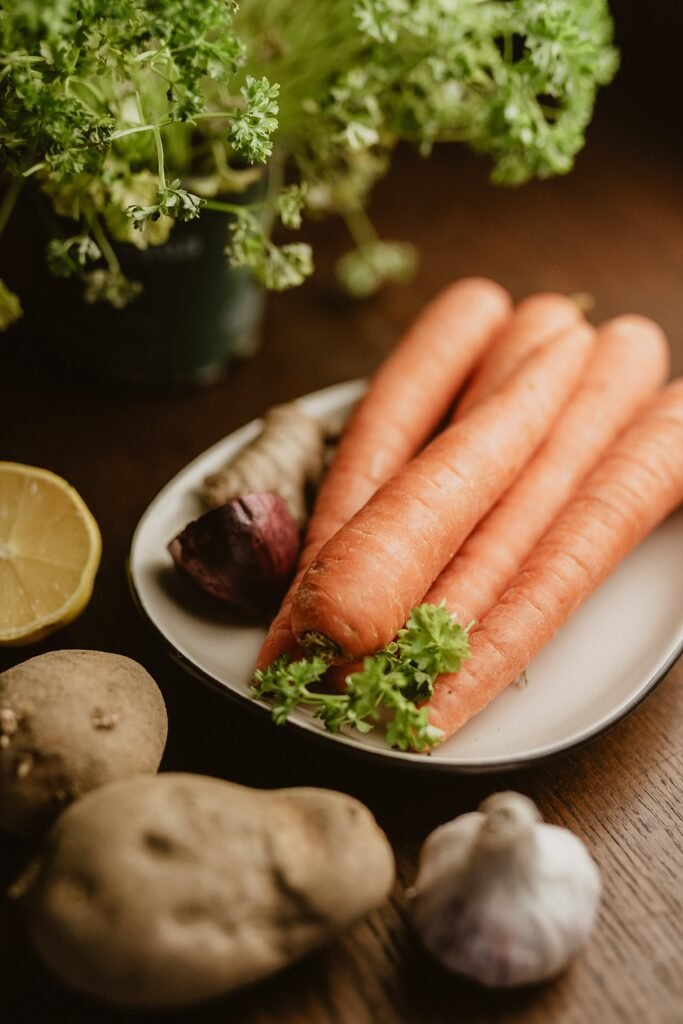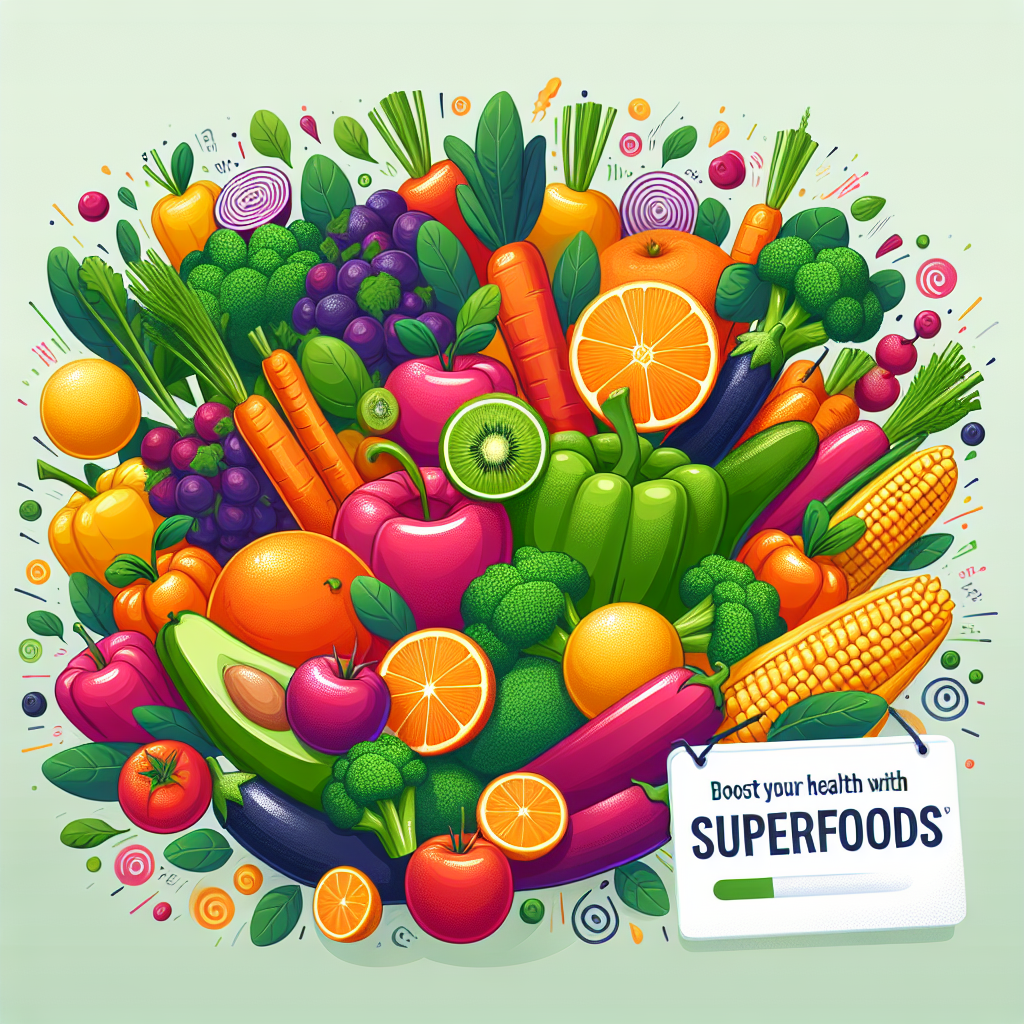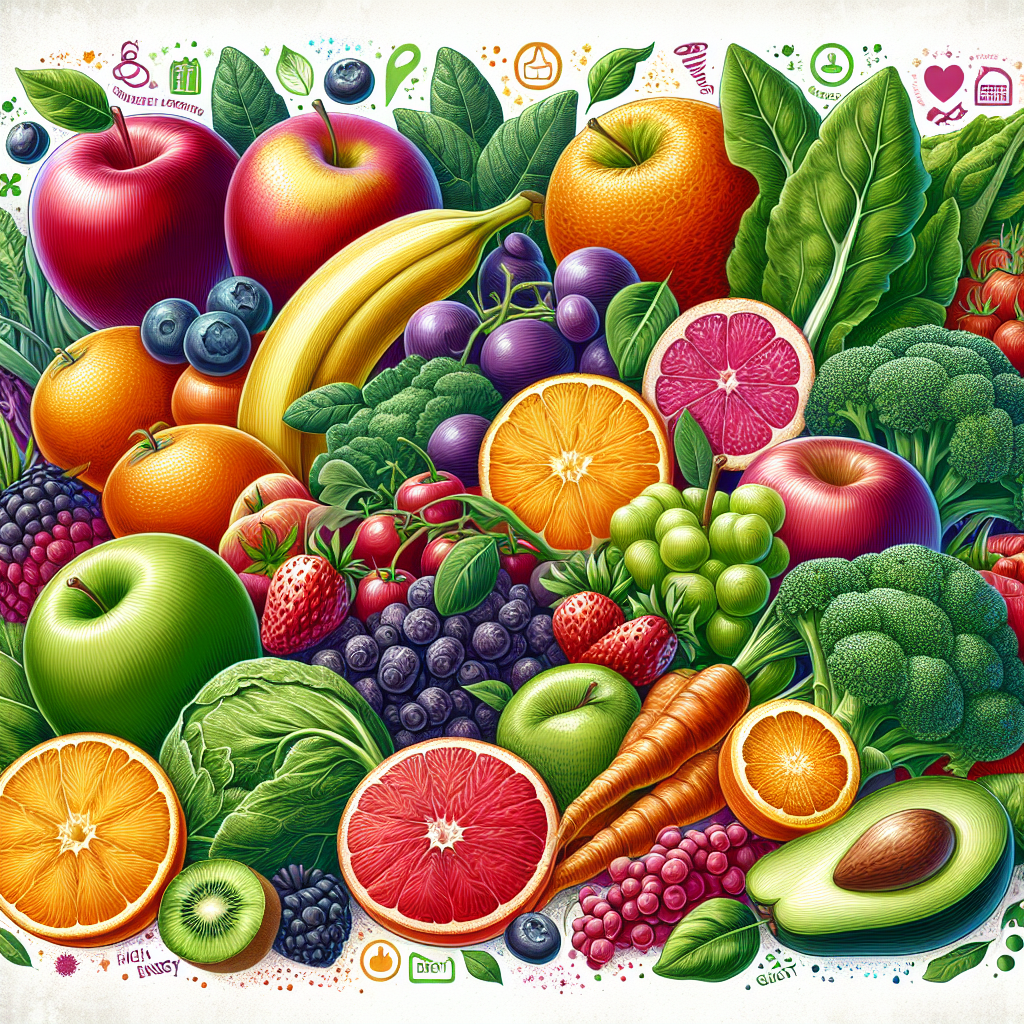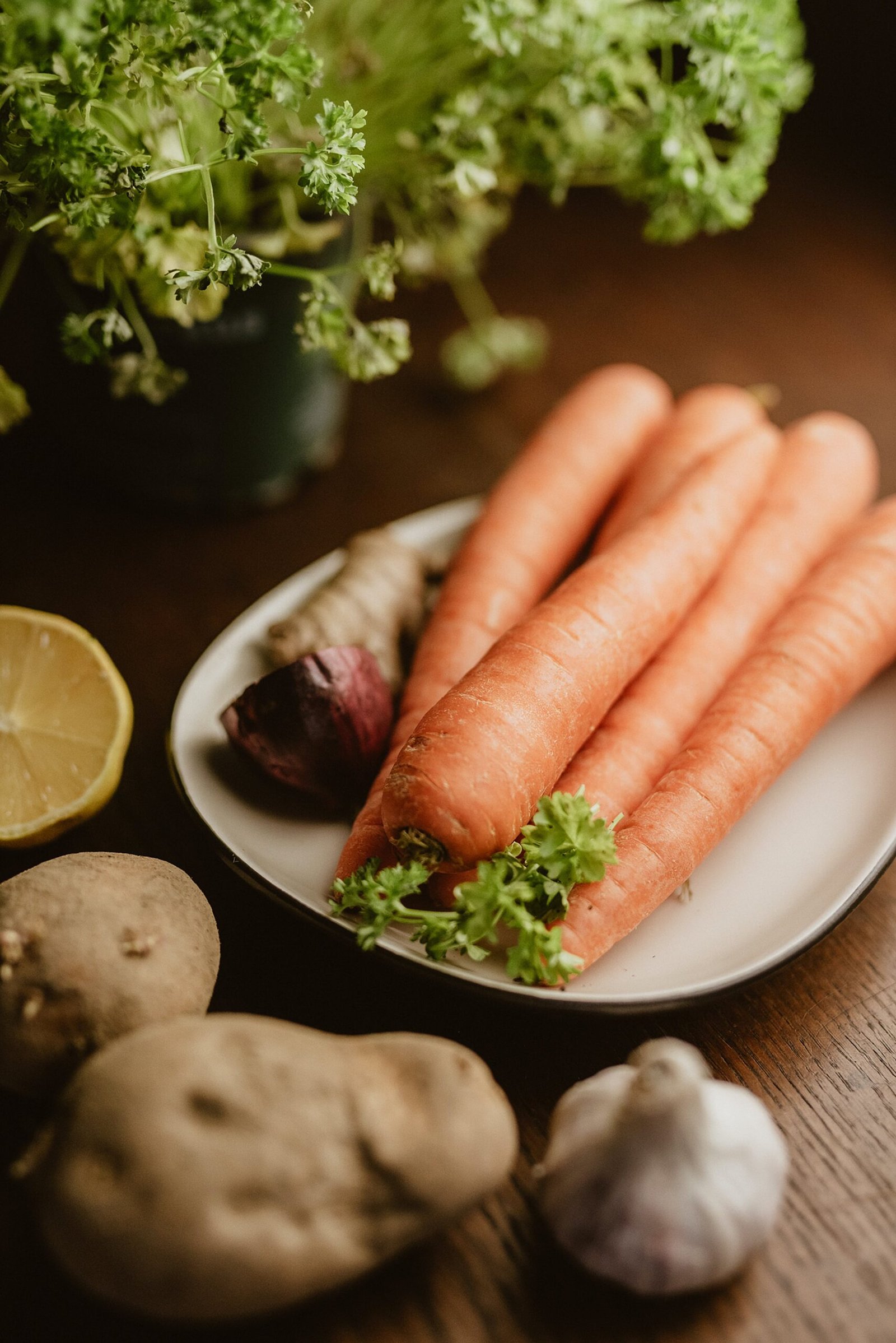Did you know that incorporating more fruits and vegetables into your diet can have a significant impact on your weight management goals? It’s true! These nutrient-packed powerhouses not only provide essential vitamins, minerals, and fiber, but they can also help you feel fuller for longer and reduce your calorie intake. In this article, we will explore the various ways in which fruits and vegetables can support your weight management journey and help you achieve a healthier, happier you. So, get ready to discover the incredible benefits of these colorful and delicious natural wonders!

The Role of Fruits in Weight Management
High Fiber Content
Fruits are known for their high fiber content, which plays a crucial role in weight management. Fiber helps you to feel fuller for longer periods, reducing the likelihood of overeating or snacking on unhealthy foods. It also aids in digestion, preventing constipation and promoting a healthy gut.
Low-Calorie Density
Another advantage of incorporating fruits into your weight management plan is their low-calorie density. Fruits are generally lower in calories compared to processed snacks or desserts, allowing you to indulge in a sweet treat without consuming excessive calories. This helps in creating a calorie deficit, which is essential for weight loss and maintenance.
Natural Sugars
While fruits contain natural sugars, unlike the added sugars in many processed foods, they come packaged with essential nutrients, vitamins, and minerals. These nutrients contribute to your overall health while satisfying your sweet tooth. By opting for fruits as a natural sugar source, you can reduce your intake of added sugars, which are often linked to weight gain and various health issues.
Hydration
Fruits, such as watermelon and oranges, have a high water content, which aids in hydration. Proper hydration is essential for weight management, as it can help regulate your appetite, improve metabolism, and support overall bodily functions. By incorporating fruits that are hydrating into your diet, you can maintain optimal hydration levels while reducing the consumption of sugary drinks or high-calorie alternatives.
Reduced Risk of Weight Gain
Research suggests that consuming fruits regularly can contribute to weight loss and reduce the risk of weight gain. Fruits are nutrient-dense, filling, and low in calories, making them an excellent snack or addition to any meal. By incorporating a variety of fruits into your diet, you can create a balanced eating plan that supports your weight management goals.
The Role of Vegetables in Weight Management
Low-Calorie Options
Vegetables are a fantastic choice when it comes to weight management due to their low-calorie content. They allow you to not only fill up your plate but also satisfy your hunger without consuming excessive calories. By incorporating more vegetables into your meals, you can create a sense of fullness while maintaining a calorie deficit necessary for weight loss.
High in Fiber
Similar to fruits, vegetables are rich in fiber, which aids in digestion, promotes gut health, and helps regulate your blood sugar levels. By choosing fiber-rich vegetables, such as broccoli or kale, you can feel satiated for longer periods, reducing the temptation to overeat or indulge in less healthy food choices.
Nutrient Density
One of the key benefits of consuming vegetables is their nutrient density. Vegetables are packed with essential vitamins, minerals, and antioxidants that promote overall health while keeping your calorie intake in check. By incorporating a variety of vegetables into your meals, you can ensure that you meet your nutrient requirements while working towards your weight management goals.
Blood Sugar Control
Vegetables, particularly non-starchy ones like spinach or peppers, have a minimal impact on blood sugar levels. This is beneficial for weight management, as stable blood sugar levels can help control cravings and prevent overeating. Incorporating vegetables into your meals can help maintain consistent energy levels throughout the day, reducing the risk of energy crashes and subsequent unhealthy snacking.
Increased Satiety
With their high water content and fiber content, vegetables are excellent for increasing feelings of fullness and reducing appetite. By incorporating more vegetables into your meals, you can create a sense of satisfaction and reduce the likelihood of overeating or indulging in unhealthy snacks. This can contribute to long-term weight management success.
Fruits and Vegetables as Meal Replacements
Replacing High-Calorie Foods
One effective strategy for weight management is using fruits and vegetables as meal replacements for high-calorie foods. Rather than reaching for calorie-dense meals or snacks, you can opt for a fruit or vegetable-based alternative. For example, replacing a high-calorie dessert with a bowl of berries or swapping out pasta for zucchini noodles can significantly reduce your overall calorie intake.
Building a Balanced Meal Plan
Incorporating fruits and vegetables into your meal plan ensures a balance of essential nutrients while keeping the calorie count in check. Instead of relying heavily on processed or calorie-laden foods, focus on developing meals that feature a variety of fruits and vegetables. This way, you can create a sustainable and balanced weight management plan that supports your overall health.
Ensuring Adequate Nutrient Intake
Fruits and vegetables are rich in essential vitamins, minerals, and antioxidants that are necessary for a well-functioning body. By replacing nutrient-poor foods with fruits and vegetables, you not only reduce your calorie intake but also ensure that you meet your nutrient requirements. This is vital for maintaining overall health and well-being while working towards your weight management goals.
Sustainable Weight Loss Strategy
Incorporating fruits and vegetables as meal replacements can contribute to a sustainable weight loss strategy. By opting for healthier alternatives that provide essential nutrients and lower calorie counts, you can create a lifestyle that supports long-term weight management success. This approach allows for flexibility and enjoyment while promoting good health.
Best Fruits for Weight Loss
Berries
Berries, such as strawberries, blueberries, and raspberries, are not only delicious but also packed with fiber and antioxidants. These fruits are low in calories and can help satisfy your sweet cravings without derailing your weight management efforts. Whether added to yogurt, smoothies, or enjoyed on their own, berries are a perfect choice for incorporating into your weight loss diet.
Grapefruit
Grapefruit is often touted as a weight loss superfood due to its low calorie and high fiber content. It is also known for its ability to assist with appetite control and blood sugar regulation. Including grapefruit in your diet can be as simple as having a serving as a snack or adding it to your morning routine, such as enjoying a half grapefruit with breakfast.
Apples
The saying “an apple a day keeps the doctor away” holds some truth when it comes to weight management. Apples are rich in fiber, provide hydration, and have a satisfying crunch. They make for a convenient and portable snack, making it easier to resist unhealthy options when hunger strikes. Experiment with different apple varieties to find your favorite and incorporate them into your daily routine.
Pears
Similar to apples, pears are an excellent choice for weight loss due to their fiber and water content. They provide a sweet and refreshing snack while keeping your calorie intake low. Pears can be eaten fresh, added to salads, or even cooked into delicious desserts with healthier substitutions. Their versatility and nutritional value make them a wonderful addition to any weight management plan.
Kiwi
Kiwi is a nutrient-dense fruit that offers an array of health benefits. It is packed with vitamins, minerals, and fiber, making it a great addition to a weight loss diet. Kiwis can be enjoyed on their own, added to smoothies, or used as a topping for yogurt or cereal. Incorporate this vibrant fruit into your routine to boost your nutrient intake and support your weight management efforts.

Best Vegetables for Weight Loss
Leafy Greens
Leafy greens, including spinach, kale, and Swiss chard, are highly recommended for weight loss due to their low calorie and high nutrient content. These vegetables are packed with vitamins, minerals, and antioxidants that promote overall health while keeping you feeling full. Incorporate leafy greens into salads, stir-fries, or even as a replacement for bread in wraps or sandwiches for a nutritious and satisfying meal.
Cruciferous Vegetables
Cruciferous vegetables, such as broccoli, cauliflower, and Brussels sprouts, are excellent choices for weight management. They are low in calories but high in fiber and nutrients, making them incredibly filling and satisfying. These vegetables can be roasted, steamed, or added to stir-fries, allowing you to enjoy their numerous health benefits while keeping your calorie intake in check.
Cucumber
Cucumber is a refreshing and hydrating vegetable that can support your weight management goals. With its high water content, cucumber can help you stay hydrated while providing a satisfying crunch. Enjoy cucumber slices on their own, add them to salads or sandwiches, or infuse them in water for a refreshing twist. Cucumbers are a versatile and nutritious addition to your weight loss diet.
Tomatoes
Tomatoes not only add vibrant color to your meals but also offer several health benefits. They are low in calories and high in nutrients, including vitamin C and lycopene, which has been linked to weight loss. Whether enjoyed fresh, roasted, or incorporated into sauces or soups, tomatoes can enhance the flavor of your dishes while helping you achieve your weight management goals.
Bell Peppers
Bell peppers are not only colorful and delicious but also contribute to weight management efforts. These vegetables are low in calories and high in fiber, vitamins, and antioxidants. Bell peppers can be added to salads, stir-fries, or stuffed for a nutritious and satisfying meal option. Experiment with various colors, such as red, yellow, and green, to enjoy a range of flavors and health benefits.
Including Fruits and Vegetables in a Weight Loss Diet
Meal Planning and Prepping
Meal planning and prepping are essential steps in incorporating fruits and vegetables into your weight loss diet. Plan your meals ahead, ensuring that you include a variety of fruits and vegetables in each meal. By prepping ingredients in advance and having them readily available, you can make healthier choices and create balanced meals without feeling overwhelmed.
Portion Control
While fruits and vegetables are beneficial for weight management, portion control is still crucial. Keep in mind that even low-calorie foods can contribute to weight gain if consumed in excess. Use measuring cups or a food scale to ensure that you are consuming appropriate portions. By being mindful of your serving sizes, you can enjoy the benefits of fruits and vegetables without exceeding your calorie goals.
Incorporating a Variety
To maximize the health benefits and enjoyment of fruits and vegetables, incorporate a wide variety into your diet. Aim for different colors, flavors, and textures to keep your meals exciting and nutritious. Trying new fruits and vegetables not only expands your palate but also ensures that you receive a range of essential nutrients to support your weight management goals.
Snacking on Fruits and Veggies
Instead of reaching for unhealthy snacks between meals, grab a piece of fruit or some vegetable slices. Keep a bowl of fresh fruits on your kitchen counter or pack pre-cut vegetables in individual portions for easy access. By making fruits and vegetables readily available, you are more likely to choose these nutritious options when hunger strikes.
Exploring New Recipes
Get creative in the kitchen by exploring new recipes that incorporate fruits and vegetables. Look for healthy recipes online or in cookbooks that utilize a variety of produce. Experiment with different cooking methods, spices, and seasonings to create flavorful and satisfying meals. By making your meals enjoyable, you are more likely to stick to your weight management plan in the long run.

The Importance of a Balanced Diet
Carbohydrates
Carbohydrates are an essential macronutrient that provides the body with energy. Incorporating complex carbohydrates, such as whole grains, fruits, and vegetables, into your diet can help sustain energy levels and support weight management. Focus on choosing nutrient-dense carbohydrates that are less processed and provide a range of vitamins, minerals, and fiber.
Proteins
Protein plays a vital role in weight management as it promotes feelings of fullness, supports muscle growth and recovery, and aids in the maintenance of a healthy metabolism. Include a variety of lean protein sources, such as poultry, fish, legumes, and tofu, in your meals. This will help you meet your daily protein needs while supporting your weight management goals.
Fats
Contrary to popular belief, fat is an essential component of a balanced diet. Incorporating healthy fats, such as avocados, nuts, seeds, and olive oil, can provide satiety, support brain health, and aid in the absorption of fat-soluble vitamins. However, it is important to keep portion sizes in check, as fats are calorie-dense. Aim for moderation and choose unsaturated fats over saturated or trans fats.
Vitamins and Minerals
Fruits and vegetables are a rich source of essential vitamins and minerals that are crucial for overall health and weight management. Incorporating a variety of colorful produce into your diet will help ensure that you receive a wide range of these vital nutrients. However, if you have specific dietary restrictions or concerns, consult with a registered dietitian to develop a personalized plan.
Creating a Long-Term Healthy Lifestyle
Rather than focusing solely on weight loss, prioritize creating a long-term healthy lifestyle. This includes incorporating a balanced diet that consists of fruits, vegetables, lean proteins, whole grains, and healthy fats. Developing sustainable habits, such as regular physical activity and stress management, is crucial for maintaining a healthy weight and overall well-being.
Potential Pitfalls to Avoid
Fruit Juice and Smoothies
While fruits are nutritious, fruit juice and smoothies can contain high amounts of added sugars and calories. These beverages may lack the fiber present in whole fruits, leading to increased calorie consumption and potential weight gain. If you enjoy fruit juice or smoothies, opt for homemade versions with little to no added sugars and consider incorporating whole fruits to maintain the fiber content.
Overconsumption of Dried Fruits
Dried fruits can be convenient and nutritious snacks, but they can also be calorie-dense due to their reduced water content. Consuming large quantities of dried fruits can lead to excessive calorie intake. If you choose dried fruits, practice portion control and be mindful of their calorie content. Alternatively, enjoy fresh fruits, which offer similar nutritional benefits with a higher water content.
Sugary Sauces and Dressings
While vegetables can be a healthy addition to meals, be cautious of sugary sauces and dressings. These condiments may add unnecessary calories and hidden sugars to your dishes. Opt for homemade dressings using healthier options like olive oil, lemon juice, or vinegar. Use spices and herbs to add flavor to your meals instead of relying on high-calorie sauces.
Fried or Breaded Vegetables
While vegetables can be a healthy choice, the cooking methods used can significantly impact their nutritional value. Avoid deep-frying or breading vegetables, as this adds unnecessary calories and unhealthy fats. Instead, try steaming, roasting, grilling, or sautéing your vegetables with minimal oil to preserve their nutritional content while enhancing their flavor.
Unbalanced Diets
Focusing solely on fruits and vegetables without incorporating other essential food groups may lead to an unbalanced diet. It is important to include lean proteins, whole grains, and healthy fats in your meals to ensure that your body receives all the necessary nutrients. Consulting with a registered dietitian can help you develop a well-rounded and personalized weight loss plan.

Tips for Incorporating More Fruits and Vegetables
Plan Weekly Grocery Shopping
Make a grocery list and plan your meals for the week, ensuring that fruits and vegetables are featured prominently. This will help you stay organized and make healthier choices while grocery shopping. By having a well-stocked pantry and refrigerator, you will be more likely to reach for these nutritious options.
Try New Recipes and Cooking Techniques
Explore new recipes and cooking techniques to keep your meals exciting and enjoyable. Look for healthy recipe resources or join cooking classes to learn new skills and discover unique ways to incorporate fruits and vegetables into your meals. Experiment with different flavors, spices, and seasonings to create delicious and nutritious dishes.
Add Fruits and Veggies to Every Meal
Make a conscious effort to include fruits and vegetables in every meal. Whether it’s adding berries to your breakfast oatmeal, having a large salad for lunch, or incorporating roasted vegetables into your dinner, finding ways to incorporate produce into each meal ensures that you meet your recommended daily servings.
Experiment with Different Flavors
Don’t be afraid to experiment with different flavors when it comes to fruits and vegetables. Try fruits you haven’t had before or mix different varieties together for a unique taste. With vegetables, experiment with various herbs, spices, and seasoning blends to create bold and enjoyable flavors. By expanding your palate, you can make fruits and vegetables more enticing and enjoyable.
Engage in Community Supported Agriculture Programs
Consider joining a Community Supported Agriculture (CSA) program or exploring local farmer’s markets to support local farmers and access fresh produce. CSA programs provide weekly or monthly shares of fruits and vegetables directly from local farms, allowing you to enjoy seasonal and locally sourced produce. Engaging in these programs not only provides you with high-quality produce, but also contributes to sustainable agriculture practices.
Conclusion
Fruits and vegetables play a powerful role in weight management. With their high fiber content, low-calorie density, natural sugars, and hydrating properties, they can promote feelings of fullness, aid in digestion, and support overall health. By incorporating a variety of fruits and vegetables into your diet, you can create a sustainable and healthy lifestyle that aligns with your weight management goals. Remember to make meal planning a priority, practice portion control, and ensure a balanced diet that includes all essential nutrients. Avoid common pitfalls and find enjoyable ways to incorporate fruits and vegetables into every meal. By utilizing these tips and embracing the benefits of fruits and vegetables, you can successfully manage your weight and achieve long-term health.


